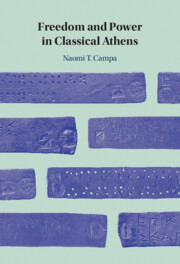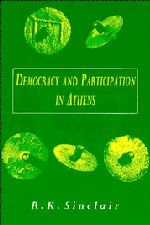Freedom and Power in Classical Athens
Athenian democracy was distinguished from other ancient constitutions by its emphasis on freedom. This was understood, Naomi T. Campa argues, as being able to do 'whatever one wished,' a widely attested phrase. Citizen agency and power constituted the core of democratic ideology and institutions. Rather than create anarchy, as ancient critics claimed, positive freedom underpinned a system that ideally protected both the individual and the collective. Even freedom, however, can be dangerous. The notion of citizen autonomy both empowered and oppressed individuals within a democratic hierarchy. These topics strike at the heart of democracies ancient and modern, from the discursive principles that structure political procedures to the citizen's navigation between the limitations of law and expression of individual will to the status of noncitizens within a state. This title is part of the Flip it Open Programme and may also be available Open Access. Check our website Cambridge Core for details.
- Provides a historically sensitive account of a central democratic feature in conversation with modern concerns
- Analyzes both democratic ideology and practice
- Presents all ancient texts in the original language and translation
Reviews & endorsements
'Advanced students and academics interested in ancient Greek political theory are the primary audience for this book. … Recommended.' R. T. Ingoglia, Choice
'… provides a bold and fresh perspective on two of the oldest concepts in the history of political thought. 'Freedom and Power' represents an enormously important contribution and is a must-read for anyone interested in ancient Athenian history and political thought and the history of freedom more generally.' Avshalom M. Schwartz, The Review of Politics
'Best for graduate collections in military history, cultural studies, and Caribbean studies. … Recommended.' R. Berleant-Schiller, Choice
Product details
April 2024Adobe eBook Reader
9781009221412
0 pages
This ISBN is for an eBook version which is distributed on our behalf by a third party.
Table of Contents
- 1. Introduction: freedom, power, and Athenian Democracy
- 2. Democratic eleutheria as positive freedom
- 3. Oratorical ambiguity
- 4. Power and the citizen
- 5. The powerless and unfree: a case study
- 6. Conclusion: the reach of freedom.




